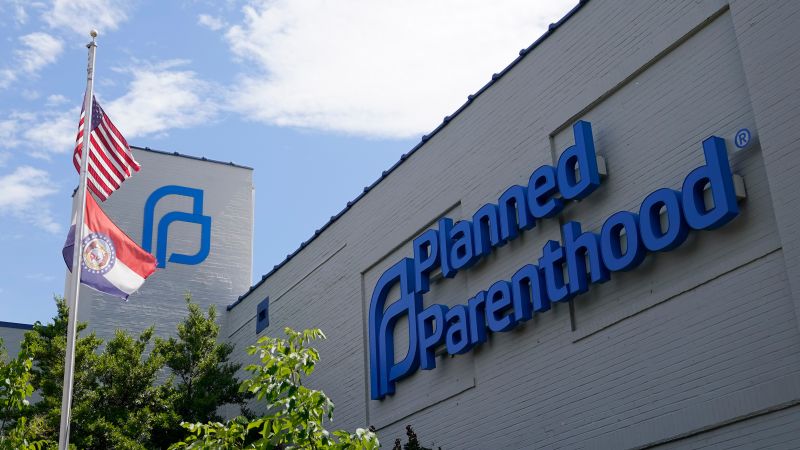
The Supreme Court on Wednesday will debate whether patients may sue states that cut Medicaid funding for Planned Parenthood , teeing up a dispute over preventive healthcare that has been drawn into the fraught national fight over abortion access. A ruling from the conservative Supreme Court, expected by the end of June, could have profound implications for the ability of patients to access care at Planned Parenthood clinics across the country and may shed light on when Americans may sue to enforce the requirements that Congress includes in spending laws. Though technically not about abortion, the appeal has attracted enormous attention from groups engaged in that issue.
In one telling sign of that dynamic, the director of the South Carolina Department of Health and Human Services will be represented at the Supreme Court by Alliance Defending Freedom, a religious legal group that helped orchestrate the overturning of Roe v. Wade in 2022. At issue is an executive order South Carolina Gov.

Henry McMaster signed in 2018 that yanked Medicaid funding for the state’s two Planned Parenthood clinics. The Republican governor argued that those payments amounted to a taxpayer subsidy for abortion. Federal and state law prohibit Medicaid from paying for abortions in most cases.
McMaster’s order had the effect of also blocking patients from receiving other services from Planned Parenthood. A patient named Julie Edwards, who has diabetes, and Planned Parenthood South Atlantic sued the state, noting that federal law gives Medicaid patients a right to access care at any qualified doctor’s office willing to see them. “It’s not about abortion,” Catherine Humphreville, senior staff attorney at Planned Parenthood Federation of America, told CNN.
“It’s about peoples’ ability to access basic services like birth control, like well-person exams, like cancer screenings. Many patients just don’t have access to these services.” If the court sides with South Carolina, it will likely embolden other conservative governors to cut Planned Parenthood from their Medicaid programs, blocking beneficiaries from accessing those services, said Sonia Suter, a George Washington University law professor and the founding director of the school’s Health Law Initiative.
That, she said, would have a “huge impact on access to care.” An irony of that outcome, she said, is that it could limit access to contraceptive care. “What’s really going to end up happening is an increase in unintended pregnancies,” she said.
Groups that oppose abortion have weighed in with a bevy of briefs at the Supreme Court arguing that because money is fungible, the Medicaid payments to Planned Parenthood indirectly support the procedure. Lawmakers in South Carolina have enacted a ban on most abortions after six weeks of pregnancy. “By filing this lawsuit, they made it an abortion case,” said Katie Daniel, director of legal affairs and policy counsel with Susan B.
Anthony Pro-Life America. The idea that preventing Medicaid payments to Planned Parenthood “prevents women or families from receiving contraception or other types of health care relies on the premise that Planned Parenthood is the only game in town,” Daniel said. “That’s absolutely not true.
” The technical legal dispute for the court deals with whether Medicaid patients have a right to sue to enforce requirements included in spending laws approved by Congress – in this case, the “any-qualified provider” requirement. The Supreme Court has long moved cautiously on that question in other contexts, though a 7-2 majority found such a right in a related case two years ago . That appeal involved a nursing home patient whose wife sued over what she said was inadequate care.
In an opinion written by liberal Justice Ketanji Brown Jackson that was joined by both conservative and liberal colleagues, the court found that the Federal Nursing Home Reform Act gave the plaintiff a right to sue. Conservative Justice Amy Coney Barrett wrote separately to say that while she agreed with the outcome in that case, the court should “tread carefully” before allowing parties to sue to enforce requirements in other spending laws. Chief Justice John Roberts joined Barrett on that opinion.
That concurrence could make Barrett and Roberts, both of whom are always important to watch, particularly key during Wednesday’s oral arguments. Critics say that without giving beneficiaries a right to sue it would be virtually impossible to enforce requirements Congress includes in spending laws. The federal government could cut its share of Medicaid funding to a state for noncompliance, but that is impractical given the wide reliance on the program.
President Donald Trump’s administration told the Supreme Court in February that it supports South Carolina’s position, which is a break from the Biden administration. In the home care case, Biden’s Justice Department told the Supreme Court in a footnote that the Medicaid provision at issue now would allow Americans to sue. South Carolina has repeatedly lost its effort to defend the governor’s order in court.
A unanimous panel of the Richmond-based 4th US Circuit Court of Appeals sided with Planned Parenthood most recently last year. But the state believes that the Supreme Court’s decision in the nursing home case could strengthen its hand. Reading a right to sue into the federal Medicaid law, South Carolina told the Supreme Court in written arguments, “would undermine the relationship between the states and the federal government.
” “The court has set a high bar for recognizing private rights in spending statutes,” the state said, “and the any-qualified-provider provision doesn’t clear it.”.















